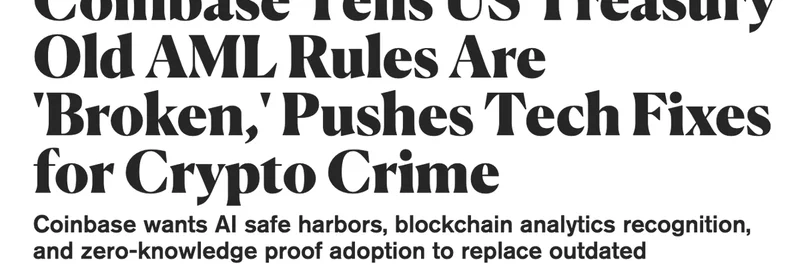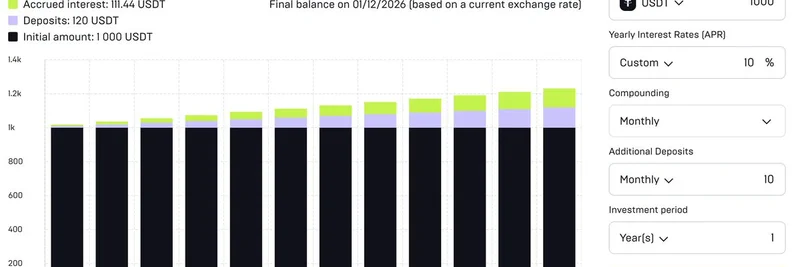In a recent tweet, Uma Roy, CEO of Succinct Labs, spotlighted Coinbase's ambitious push to overhaul the 50-year-old KYC and AML framework using cutting-edge blockchain tech. It's a move that's got the crypto community buzzing, especially among meme token enthusiasts who value privacy and decentralization. Let's break it down and see why this could be huge for the world of meme coins.
The Backstory: Coinbase's Letter to Treasury
Last week, Coinbase's Chief Legal Officer Paul Grewal penned a detailed 40-page letter to the US Treasury Department. This wasn't just a complaint—it was a blueprint for updating archaic anti-money laundering (AML) and know-your-customer (KYC) rules with modern tools. The goal? Protect consumers better while ditching the need for companies to hoard sensitive user data, which often becomes a target for hackers.
The letter responds to Treasury's call for ideas on detecting illicit activity in digital assets. Coinbase argues that the current system, rooted in the 1970s Bank Secrecy Act, is ill-equipped for today's blockchain era. Instead, they propose leveraging technology to make compliance smarter, faster, and more privacy-friendly.
Breaking Down the Three-Step Plan
K Kulkarni from Succinct Labs summarized the plan neatly in the quoted thread, highlighting how zero-knowledge (ZK) proofs play a starring role. If you're new to ZK, think of it as a cryptographic magic trick: it lets you prove something is true without revealing the underlying details. For example, proving you're over 18 without showing your birthdate.
1. Decentralized ID and ZK Proofs
The first pillar is updating the Bank Secrecy Act to recognize decentralized identities and ZK proofs as valid verification methods. This means users could verify their identity privately, without exposing personal info. Law enforcement could still access data via subpoenas to issuers, but everyday platforms wouldn't need to store massive databases of user info.
Succinct Labs is already building tools for this, offering an API that integrates ZK proofs with wallets and ID issuers. For meme token traders, this could mean seamless onboarding without sacrificing anonymity—perfect for those quick degen trades without Big Brother watching every move.
2. AI and APIs for Real-Time Defense
Next up: harnessing AI for fraud detection and AML, paired with secure APIs to share risk signals instantly. This would block shady transfers before they settle, making the system proactive rather than reactive.
In the meme token space, where pumps and dumps happen in seconds, real-time AI monitoring could weed out scams without slowing down legitimate fun. It's like having a smart bouncer at the door of your favorite meme coin party.
3. Onchain Analytics: Know the Transaction, Not Just the Customer
Finally, shift focus to public blockchain data for ongoing monitoring. Instead of static KYC checks, use onchain analytics to "know the transaction." Blockchains provide richer, more transparent data than traditional finance, enabling dynamic risk assessment.
For meme tokens built on chains like Solana or Base, this means regulators could embrace the transparency of public ledgers while respecting user privacy. No more blanket surveillance—just targeted, tech-driven oversight.
Why This Matters for Meme Tokens
Meme tokens thrive on community, virality, and a bit of rebellion against traditional finance. But regulatory hurdles like strict KYC can stifle innovation and push users to unregulated corners. Coinbase's proposal could bridge that gap, allowing meme projects to comply without centralizing control or compromising on decentralization.
Imagine trading your favorite dog-themed coin with ZK-verified identity: you stay pseudonymous, platforms reduce data breach risks, and regulators get the tools they need. It's a win-win that could attract more institutional players to the meme space, potentially boosting liquidity and legitimacy.
Community Reactions: Memes Meet Regulation
The thread sparked lively replies, including from meme coin communities. One standout was from @ShieldCoinBase, a pro-crypto meme token inspired by Coinbase's shield logo, who chimed in with "Very based indeed, just like shield." Their artistic reply image captures the optimistic vibe, showing a shield-headed character overlooking a futuristic cityscape.
Other reactions included shouts to $NOCK and general hype for ZK tech. It's clear the meme crowd sees this as a step toward a more private, efficient crypto world.
As blockchain practitioners, keeping an eye on these developments is key. If adopted, ZK-powered KYC could redefine how we build and trade meme tokens, making the ecosystem safer and more accessible. For more on emerging tech in memes, stick with Meme Insider.


